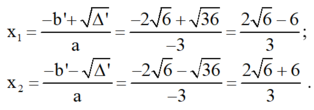
Hãy nhập câu hỏi của bạn vào đây, nếu là tài khoản VIP, bạn sẽ được ưu tiên trả lời.


a) Phương trình bậc hai 4 x 2 + 4 x + 1 = 0
Có a = 4; b’ = 2; c = 1; Δ ’ = ( b ’ ) 2 – a c = 2 2 – 4 . 1 = 0
Phương trình có nghiệm kép là:

b) Phương trình 13852 x 2 – 14 x + 1 = 0
Có a = 13852; b’ = -7; c = 1;
Δ ’ = ( b ’ ) 2 – a c = ( - 7 ) 2 – 13852 . 1 = - 13803 < 0
Vậy phương trình vô nghiệm.
c) Phương trình bậc hai 5 x 2 – 6 x + 1 = 0
Có: a = 5; b’ = -3; c = 1.; Δ ’ = ( b ’ ) 2 – a c = ( - 3 ) 2 – 5 . 1 = 4 > 0
Phương trình có hai nghiệm phân biệt:

d) Phương trình bậc hai: ![]()

Phương trình có hai nghiệm phân biệt :

Kiến thức áp dụng
Phương trình ax2 + bx + c = 0 (a ≠ 0) có biệt thức Δ = b2 – 4ac.
+ Nếu Δ > 0, phương trình có hai nghiệm phân biệt 
+ Nếu Δ = 0, phương trình có nghiệm kép  ;
;
+ Nếu Δ < 0, phương trình vô nghiệm.

Lời giải:
a. ĐKXĐ: $x\geq 4$
PT $\Leftrightarrow \sqrt{(x-4)+4\sqrt{x-4}+4}=2$
$\Leftrightarrow \sqrt{(\sqrt{x-4}+2)^2}=2$
$\Leftrightarrow |\sqrt{x-4}+2|=2$
$\Leftrightarrow \sqrt{x-4}+2=2$
$\Leftrightarrow \sqrt{x-4}=0$
$\Leftrightarrow x=4$ (tm)
b. ĐKXĐ: $x\in\mathbb{R}$
PT $\Leftrightarrow \sqrt{(2x-1)^2}=\sqrt{(x-3)^2}$
$\Leftrightarrow |2x-1|=|x-3|$
\(\Rightarrow \left[\begin{matrix} 2x-1=x-3\\ 2x-1=3-x\end{matrix}\right.\Rightarrow \left[\begin{matrix} x=-2\\ x=\frac{4}{3}\end{matrix}\right.\)
c.
PT \(\Rightarrow \left\{\begin{matrix} 2x-1\geq 0\\ 2x^2-2x+1=(2x-1)^2\end{matrix}\right.\Leftrightarrow \left\{\begin{matrix} x\geq \frac{1}{2}\\ 2x^2-2x=0\end{matrix}\right.\)
\(\Leftrightarrow \left\{\begin{matrix} x\geq \frac{1}{2}\\ 2x(x-1)=0\end{matrix}\right.\Rightarrow x=1\)

\(a,PT\Leftrightarrow\left|x+3\right|=3x-6\\ \Leftrightarrow\left[{}\begin{matrix}x+3=3x-6\left(x\ge-3\right)\\x+3=6-3x\left(x< -3\right)\end{matrix}\right.\Leftrightarrow\left[{}\begin{matrix}x=\dfrac{9}{2}\left(tm\right)\\x=\dfrac{3}{4}\left(ktm\right)\end{matrix}\right.\\ \Leftrightarrow x=\dfrac{9}{2}\\ b,PT\Leftrightarrow\left|x-1\right|=\left|2x-1\right|\\ \Leftrightarrow\left[{}\begin{matrix}x-1=2x-1\\1-x=2x-1\end{matrix}\right.\Leftrightarrow\left[{}\begin{matrix}x=0\\x=\dfrac{2}{3}\end{matrix}\right.\)
\(c,ĐK:x\le\dfrac{2}{5}\\ PT\Leftrightarrow4-5x=25x^2-20x+4\\ \Leftrightarrow25x^2-15x=0\\ \Leftrightarrow5x\left(5x-3\right)=0\\ \Leftrightarrow\left[{}\begin{matrix}x=0\left(tm\right)\\x=\dfrac{3}{5}\left(ktm\right)\end{matrix}\right.\Leftrightarrow x=0\\ d,ĐK:x\le\dfrac{2}{5}\\ PT\Leftrightarrow4-5x=2-5x\\ \Leftrightarrow x\in\varnothing\)

Lời giải:
a.
PT $\Leftrightarrow |2x+1|=|x-1|$
$\Leftrightarrow 2x+1=x-1$ hoặc $2x+1=-(x-1)$
$\Leftrightarrow x+2=0$ hoặc $3x=0$
$\Leftrightarrow x=-2$ hoặc $x=0$ (tm)
b.
PT $\Leftrightarrow 9x^2-6x+1=x^2-4x+4$
$\Leftrightarrow 8x^2-2x-3=0$
$\Leftrightarrow (4x-3)(2x+1)=0$
$\Leftrightarrow 4x-3=0$ hoặc $2x+1=0$
$\Leftrightarrow x=\frac{3}{4}$ hoặc $x=\frac{-1}{2}$ (tm)
a: =>|2x+1|=|x-1|
=>2x+1=x-1 hoặc 2x+1=-x+1
=>x=-2 hoặc x=0
b: =>|3x-1|=|x-2|
=>3x-1=x-2 hoặc 3x-1=-x+2
=>2x=-1 hoặc 4x=3
=>x=-1/2 hoặc x=3/4

\(4x^4+4x^3+x^2+3x\ge0\)
\(4x^4+4x^2+1-\left(2x^4+6x^3-2x^2+4x-1\right)=\left(x^2-x+1\right)\sqrt{\left(x^2-x+1\right)\left(2x^2+1\right)+2x^4+6x^3-2x^3+4x-1}\)
\(\Leftrightarrow\left(2x^2+1\right)^2-\left(2x^4+6x^3-2x^2+4x-1\right)=\left(x^2-x+1\right)\sqrt{\left(x^2-x+1\right)\left(2x^2+1\right)+2x^4+6x^3-2x^3+4x-1}\)
\(2x^2+1=u;\sqrt{4x^4+4x^3+x^2+3x}=v\left(u>0;v>0\right)\)
\(\hept{\begin{cases}u^2-\left(2x^4+6x^3-2x^2+4x-1\right)=\left(x^2-x+1\right)v\\v^2-\left(2x^4+6x^3-2x^2+4x-1\right)=\left(x^2-x+1\right)u\end{cases}\Rightarrow u^2-v^2=\left(x^2-x+1\right)\left(v-u\right)\Leftrightarrow\orbr{\begin{cases}u=v\\u+v+x^2-x+1=0\end{cases}}}\)
- \(u+v+x^2-x+1=0\Leftrightarrow u+v+\left(x-\frac{1}{2}\right)^2=-\frac{3}{4}\)
- \(u=v\Leftrightarrow4x^4+4x^2+1=4x^4+4x^3+x^2+3x\Leftrightarrow\left(x-1\right)^3=-3x^3\Leftrightarrow x-1=-x\sqrt[3]{3}\Leftrightarrow x=\frac{1}{1+\sqrt[3]{3}}\)Đối chiếu điều kiện ta thu được nghiệm duy nhất \(x=\frac{1}{1+\sqrt[3]{3}}\)

a) 5 x 2 – x + 2 = 0 ;
a = 5; b = -1; c = 2
Δ = b 2 - 4 a c = ( - 1 ) 2 - 4 . 5 . 2
= 1 - 40 = -39 < 0
Vậy phương trình trên vô nghiệm.
b) 4 x 2 – 4 x + 1 = 0 ;
a = 4; b = -4; c = 1
Δ = b 2 - 4 a c = ( - 4 ) 2 - 4 . 4 . 1 = 16 - 16 = 0
⇒ phương trình có nghiệm kép
x = (-b)/2a = (-(-4))/2.4 = 1/2
Vậy phương trình có nghiệm duy nhất x = 1/2
c) - 3 x 2 + x + 5 = 0
a = -3; b = 1; c = 5
Δ = b 2 - 4 a c = 12 - 4 . ( - 3 ) . 5 = 1 + 60 = 61 > 0
⇒ Do Δ >0 nên áp dụng công thức nghiệm, phương trình có 2 nghiệm phân biệt
x 1 = ( 1 - √ 61 ) / 6 ; x 2 = ( 1 + √ 61 ) / 6

ĐKXĐ: ...
Đặt \(\sqrt{4x+5}=2y-3\Rightarrow4x+5=4y^2-12y+9\)
\(\Rightarrow y^2-3y+1=x\)
Ta được hệ: \(\left\{{}\begin{matrix}2x^2-6x-1=2y-3\\y^2-3y+1=x\end{matrix}\right.\)
\(\Leftrightarrow\left\{{}\begin{matrix}x^2-3x+1=y\\y^2-3y+1=x\end{matrix}\right.\)
Trừ vế cho vế: \(x^2-y^2-2\left(x-y\right)=0\)
\(\Leftrightarrow\left(x-y\right)\left(x+y-2\right)=0\Leftrightarrow\left[{}\begin{matrix}x=y\\y=2-x\end{matrix}\right.\)
\(\Leftrightarrow\left[{}\begin{matrix}x=\dfrac{\sqrt{2x+5}+3}{2}\\\dfrac{\sqrt{2x+5}+3}{2}=2-x\end{matrix}\right.\) \(\Leftrightarrow\left[{}\begin{matrix}\sqrt{2x+5}=2x-3\\\sqrt{2x+5}=1-2x\end{matrix}\right.\)
Đến đây chắc bạn tự giải được
`2x^2-6x-1=sqrt{4x+5}(x>=-5/4)`
`<=>4x^2-12x-2=2sqrt{4x+5}`
`<=>4x^2-8x+4=4x+5+2\sqrt{4x+5}+1`
`<=>(2x-2)^2=(\sqrt{4x+5}+1)^2`
Đến đây dễ gòi

Lời giải:
a. Đề thiếu
b. PT $\Leftrightarrow \sqrt{(x-1)^2}+\sqrt{(x-2)^2}=3$
$\Leftrightarrow |x-1|+|x-2|=3$
Nếu $x\geq 2$ thì pt trở thành:
$x-1+x-2=3$
$\Leftrightarrow 2x-3=3$
$\Leftrightarrow x=3$ (tm)
Nếu $1\leq x< 2$ thì:
$x-1+2-x=3\Leftrightarrow 1=3$ (vô lý)
Nếu $x< 1$ thì:
$1-x+2-x=3$
$\Leftrightarrow x=0$ (tm)

cách khác đơn giản hơn nhiều
Đk:\(x\ge1\)
\(pt\Leftrightarrow\sqrt{2\left(x-1\right)\left(x+4\right)}+\sqrt{2\left(x-1\right)\left(x+3\right)}-3\sqrt{x+4}-3\sqrt{x+3}-1=0\)
\(\Leftrightarrow\sqrt{2\left(x-1\right)\left(x+4\right)}-3\sqrt{x+4}+\sqrt{2\left(x-1\right)\left(x+3\right)}-3\sqrt{x+3}=1\)
\(\Leftrightarrow\sqrt{x+4}\left(\sqrt{2\left(x-1\right)}-3\right)+\sqrt{x+3}\left(\sqrt{2\left(x-1\right)}-3\right)=1\)
\(\Leftrightarrow\left(\sqrt{x+4}+\sqrt{x+3}\right)\left(\sqrt{2\left(x-1\right)}-3\right)=1\)
Xét Ư(1)={1;-1}={....}
Dễ nhé, tự làm nốt
Đk: \(x\ge1\)
\(pt\Leftrightarrow\sqrt{2x^2+6x-8}+\sqrt{2x^2+4x-6}-3\sqrt{x+4}-3\sqrt{x+3}-1=0\)
\(\Leftrightarrow\sqrt{2x^2+6x-8}-\frac{10}{3}\sqrt{x+3}+\frac{1}{3}\sqrt{x+3}-1\sqrt{2x^2+4x-6}-3\sqrt{x+4}=0\)
\(\Leftrightarrow\frac{2x^2+6x-8-\frac{100}{9}\left(x+3\right)}{\sqrt{2x^2+6x-8}+\frac{10}{3}\sqrt{x+3}}+\frac{x-6}{3\left(\sqrt{x+3}+3\right)}+\frac{2x^2+4x-6-9\left(x+4\right)}{\sqrt{2x^2+4x-6}+3\sqrt{x+4}}=0\)
Để đỡ rối ta đặt mấy cái mẫu \(\hept{\begin{cases}N=\sqrt{2x^2+6x-8}+\frac{10}{3}\sqrt{x+3}>0\\H=\sqrt{x+3}+3>0\\T=\sqrt{2x^2+4x-6}+3\sqrt{x+4}>0\end{cases}}\)
\(\Leftrightarrow\frac{18x^2-46x-372}{9N}+\frac{x-6}{3H}+\frac{2x^2-5x-42}{T}=0\)
\(\Leftrightarrow\left(x-6\right)\left(\frac{18x+62}{9N}+\frac{1}{3H}+\frac{2x+7}{T}\right)=0\)
Dễ thấy: \(\forall x\ge1\) thì \(\frac{18x+62}{9N}+\frac{1}{3H}+\frac{2x+7}{T}>0\)
\(\Rightarrow x-6=0\Rightarrow x=6\) (thỏa mãn)